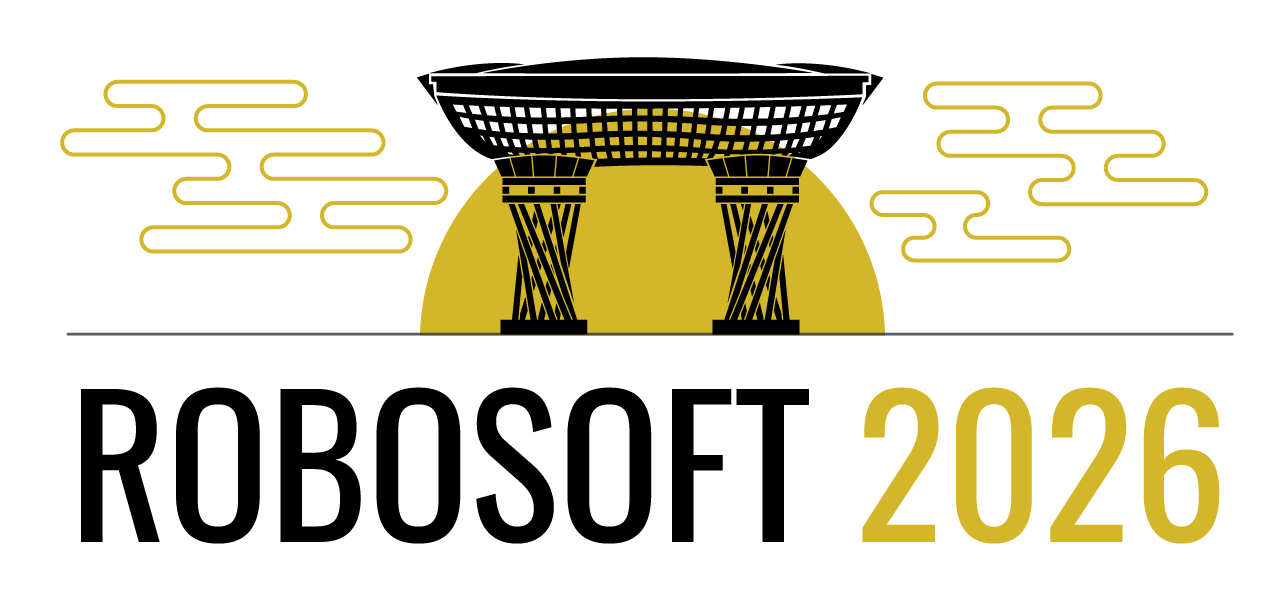Call for Workshops/Tutorials
Overview and Deadline
We invite you to submit proposals for workshops and tutorials, whether half-day or full-day in duration.Workshops and tutorials are a critical part of the IEEE RoboSoft conference and offer an opportunity for researchers to disseminate and discuss with the community the latest research results and future directions.
These sessions should extend the conference format and provide an avenue for attendees to dive deep into specific topics, engage in dynamic discussions, or acquire new skills.
- Workshops/Tutorials Proposals:
October 31st, 2025.-> November 15th, 2025.
All times are in GMT (UTC-0); deadlines close at 4:00 p.m. on the stated date.
There will be two days of workshops, one day at the beginning and one at the end of the conference. There will be concurrent tracks, consisting of either one full-day workshop/tutorial or two half workshops/tutorials. Workshops will be peer-reviewed and competitively selected based on relevance, expected impact on the community and planning, with additional consideration to ensuring topic and participants diversity. We encourage novel formats, interactive activities, discussion, and student participation.
To ensure that we hear from a variety of voices, invited speakers will have a limit of speaking in two workshops maximum, and organizers are asked to have invited speakers to confirm this. We strongly believe there are a plethora of speakers worthy of being highlighted. We encourage inviting newer or less commonly heard voices.Letters of endorsement from TCs are not required and will not be considered for the evaluation of workshop proposals. Inclusivity Matters. As part of our commitment to diversity, we encourage you to consider nationality, gender, geographical, and experience diversity when selecting workshop co-organizers, presenters and tutorial instructors.
Workshops
We encourage workshop proposals that delve into active, controversial, or emerging domains within soft robotics – whether research, teaching, or community-focused. Your workshop should spark formal or informal dialogues, facilitate brainstorming, invite student participation, and uncover novel insights in the field of soft robotics.
Tutorials
If you possess expertise in a particular aspect of soft robotics (research, teaching, or community-focused), consider submitting a tutorial proposal. Tutorials should offer participants an immersive experience, allowing them to gain understanding and practical expertise in a focus area.
Submission
To submit your Workshop or Tutorial proposal, please download and complete the template.
Submissions should be made through the conference submission system. RoboSoft 2026 uses OpenReview as its submission system for workshop/tutorial proposals. To be able to submit a paper, at least one organizer must be registered on OpenReview (ideally 7 days before the submission). Please proceed here (coming soon):
Reviewer Guidelines / Selection Criteria
Proposals will be peer-reviewed. Reviewers are encouraged to provide long-form feedback. Proposals must meet the basic requirements included in the template to be considered. Consideration will also be given to ensuring that workshops/tutorials are available on a variety of topics that span the soft robotics field. The evaluation criteria were developed to consider both proposals that follow a more traditional format and proposals that take innovative approaches to captivating the audience and contributing to the advancement of soft robotics.
We use the following six evaluation criteria aligned with the call for submissions. Strong proposals should meet all and exceed in some.
Relevance to the Community
- Below: Topic not of interest to the soft robotics community.
- Meets: Topic of interest to some or many members.
Evidence of Preparation
- Below: Missing details or requirements.
- Meets: Clear organization and meets requirements.
- Exceeds: Thorough preparation with extensive details (e.g., schedule, website).
Diversity of Speakers and Format
- Below: No evidence of diversity in speakers, activities, or formats.
- Meets: Some diversity present.
- Exceeds: Clear commitment to diverse ideas, speakers, and activities.
Cohesiveness of Speakers, Activities, and Format
- Below: Poor alignment with workshop goals or no justification.
- Meets: Generally cohesive with some justification.
- Exceeds: Strong alignment, clear justification, and inclusion of novel elements.
Interactive Elements
- Below: None or very limited.
- Meets: Standard interactions (posters, panels, debates).
- Exceeds: Tailored or innovative interactive activities that enhance engagement.
Student Participation
- Below: Not considered or mentioned briefly without plans.
- Meets: Standard participation (Q&A, posters, panels).
- Exceeds: Specific, meaningful activities to support and engage students.

